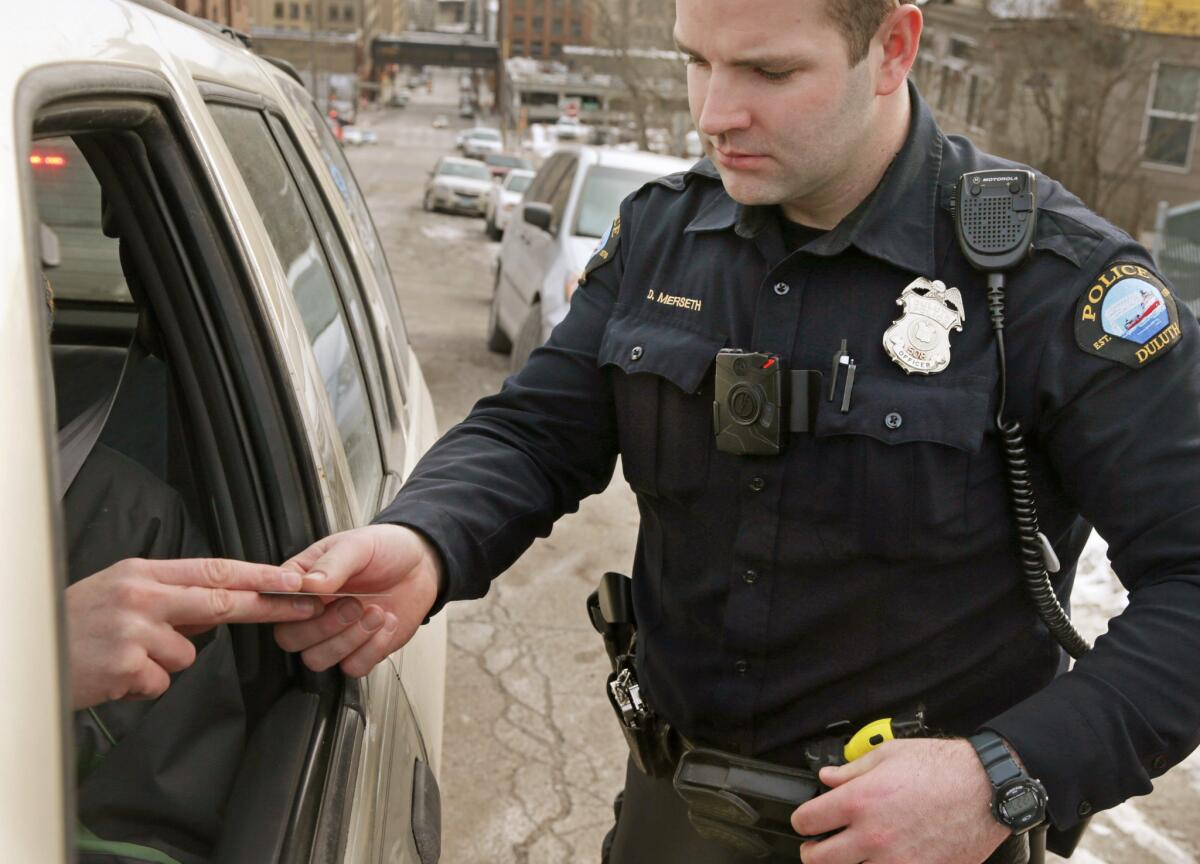Editorial: Rewrite body camera bill or put it aside

A red light on the body camera worn by Duluth, Minn. police officer Dan Merseth indicates it is active during a traffic stop in February.
- Share via
As body-worn cameras become standard gear for California’s police officers, it’s wise to have smart policy regulating how the cameras and the video they produce are used. Such as, when should cameras be turned on and off? What rights should folks not suspected of a crime have to prohibit being recorded? Who gets to see the video, and under what circumstances?
Assemblywoman Shirley Weber (D-San Diego) has tried to come up with a statewide policy that addresses questions of transparency and accountability. Her Assembly Bill 66 is a noble attempt, but at this point it fails on both counts. If this bill is not fixed — and even Weber has problems with it — it should be put aside so that legislators can try again next year.
It would be a shame to have to do that. Body cameras were becoming ubiquitous even before the growing outrage over the deaths of unarmed civilians at the hands of police across the nation. In the absence of statewide rules, police departments adopted their own. Some are decent; others, not so much. The one adopted by the Los Angeles Police Department last month isn’t one of the good ones, with the same deficiencies as Weber’s bill after it was amended.
Sadly, the original text of AB 66 was much stronger. It prohibited officers from viewing video before giving their initial statements in serious use-of-force cases, but law enforcement interests successfully lobbied to have that language removed. Seeing video first would taint an officer’s initial recollection and deepen the suspicion among some members of the public that police agencies are protecting rogue officers.
Unlike the LAPD, Weber at least attempted to allow the public release of video recordings: The bill says recordings would be subject to provisions of the Public Records Act. The problem is that the act allows exemptions for records that are part of police investigations. These exemptions are invoked regularly, and increasingly in broad terms, and courts have backed them up.
Therefore, the bill could ensure that members of the public get to see body camera video only if police officials allow them to. Such recordings ought to be presumptively public, with the burden on police to prove that releasing the recordings would compromise an investigation.
Where Weber’s bill succeeds is on privacy, outlining clear and specific provisions to protect officers and civilians. Importantly, it would ensure that victims of sexual assault and people not suspected of a crime have the right not to be recorded, and that body cameras would be shut off in sensitive places such as hospitals and ambulances.
Those provisions ought to remain part of AB 66. The rest of the bill, though, needs a heavy rewrite. A flawed body camera policy would be worse than no policy at all.
Follow the Opinion section on Twitter @latimesopinion and Facebook
More to Read
A cure for the common opinion
Get thought-provoking perspectives with our weekly newsletter.
You may occasionally receive promotional content from the Los Angeles Times.









